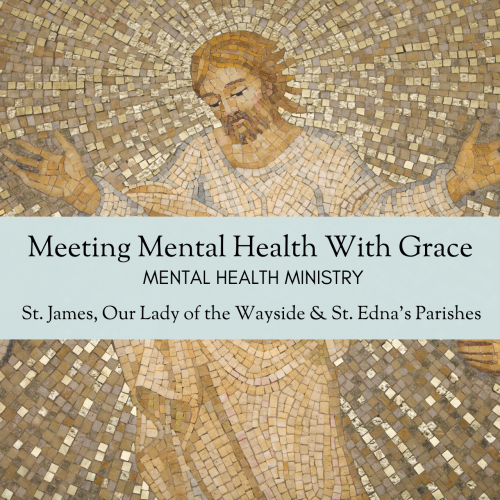Interesting Articles:
Dealing with Isolation: Click HERE for information and tips on how to handle isolation.
Has God abandoned me? Click HERE to learn the answer to this and other questions: Spirituality and Mental Illness.
Education Information:
Here is some brief information about the 3 most common concerns: Anxiety, Depression and Substance Abuse with Mental Illness (duo-diagnosis). Sources: NAMI (National Alliance on Mental Illness; Mental Health America and the National Institute of Mental Health.
Anxiety:
What is it?
Anxiety is an emotion you feel when you’re worried about something. We all experience it. Your body tenses up, and your mind becomes fixated on the thing you’re worried about. Anxiety can affect a number of things: appetite, sleep, home life and work performance. A little anxiety can be useful. For example, if you’re anxious about an upcoming exam, it might motivate you to study. But if you’re so anxious that you can’t concentrate on studying, the anxiety is no longer useful.
When anxiety starts to interfere with your daily life, you might have an anxiety disorder. Anxiety disorders are the most common mental health concern in the United States. Over 40 million adults in the U.S. (19.1%) have an anxiety disorder and approximately 7% of children aged 3-17 experience issues with anxiety each year.
What are the symptoms?
Everyone’s experience with anxiety is different, but some of the common symptoms of anxiety disorders include:
- Feeling restless and irritable
- Difficulty concentrating
- Muscle pain, tightness, or soreness
- Trouble falling asleep or staying asleep
- Feeling exhausted even after a full night’s sleep
- Going out of your way to avoid situations that make you anxious
- Intrusive thoughts (unwanted thoughts or worries that won’t go away)
Where can I learn more?
NAMI, the National Alliance on Mental Illness, has information about anxiety treatment and support. Click here to learn more.
Depression:
What is it?
If your “blues” last more than a few weeks or cause you to struggle with daily life, you may be suffering from clinical depression. Clinical depression is one of the most common mental illnesses, affecting 7% of American adults each year. It causes people to lose pleasure from daily life, can complicate other medical conditions and can even be serious enough to lead to suicide. It can happen to anyone, at any age, at any time.
Many people resist treatment because they believe depression isn’t serious, that they can treat it themselves or that it is a personal weakness rather than a serious medical illness. Fortunately, with early detection, diagnosis and a treatment plan consisting of medication, psychotherapy and healthy lifestyle choices, many people can and do get better.
What are the symptoms?
Depression can present different symptoms, depending on the person. But for most people, depressive disorder changes how they function day-to-day, and typically for more than two weeks. Common symptoms include:
- Changes in sleep
- Changes in appetite
- Lack of concentration
- Loss of energy
- Lack of interest in activities
- Hopelessness or guilty thoughts
- Changes in movement (less activity or agitation)
- Physical aches and pains
- Suicidal thoughts
Presentation: “Giving Light to the Darkness”
 On January 17, 2022, the Meeting Mental Health With Grace Ministry, hosted a panel discussion on Depression. Here are the resources from that discussion:
On January 17, 2022, the Meeting Mental Health With Grace Ministry, hosted a panel discussion on Depression. Here are the resources from that discussion:
- The Serenity Prayer
- Depression Summary
- Holistic Self-Care Scriptures
- Book Resources
Substance Use Disorder and Mental Illness (Duo-Diagnosis)
What is it?
Substance use disorders — the repeated misuse of alcohol and/or drugs — often occur simultaneously in individuals with mental illness, usually to cope with overwhelming symptoms. The combination of these two illnesses has its own term: dual diagnosis. Either disorder (substance use or mental illness) can develop first. According to the National Survey on Drug Use and Health, 9.2 million U.S. adults experienced both mental illness and a substance use disorder in 2018.
What are the symptoms?
Because many combinations of dual diagnosis can occur, symptoms vary widely. Mental health clinics are starting to use alcohol and drug screening tools to identify people at risk. Symptoms of substance use disorder may include:
- Withdrawal from friends and family
- Sudden changes in behavior
- Engaging in risky behaviors
- Developing a high tolerance and withdrawal symptoms
- Feeling like you need a drug to be able to function
Symptoms of a mental health condition can also vary greatly. Warning signs, such as extreme mood changes, confused thinking or problems concentrating, avoiding friends and social activities, and thoughts of suicide, may be reasons to seek help.
Where can I learn more?
NAMI, the National Alliance on Mental Illness, has more information about dual diagnosis treatment and support. Click here to learn more.
To learn more about other mental illnesses such as Bipolar Disorder, Schizophrenia, Borderline Personality Disorder, PTSD etc… please check out the following websites:
*NAMI offers a variety of free education classes and programs for adults who have a loved one living with a mental health concern. These classes discuss the illnesses, how to help, set boundaries, manage crisis, medications and much more. Click here for more information or contact Tracy Sherva at [email protected].


